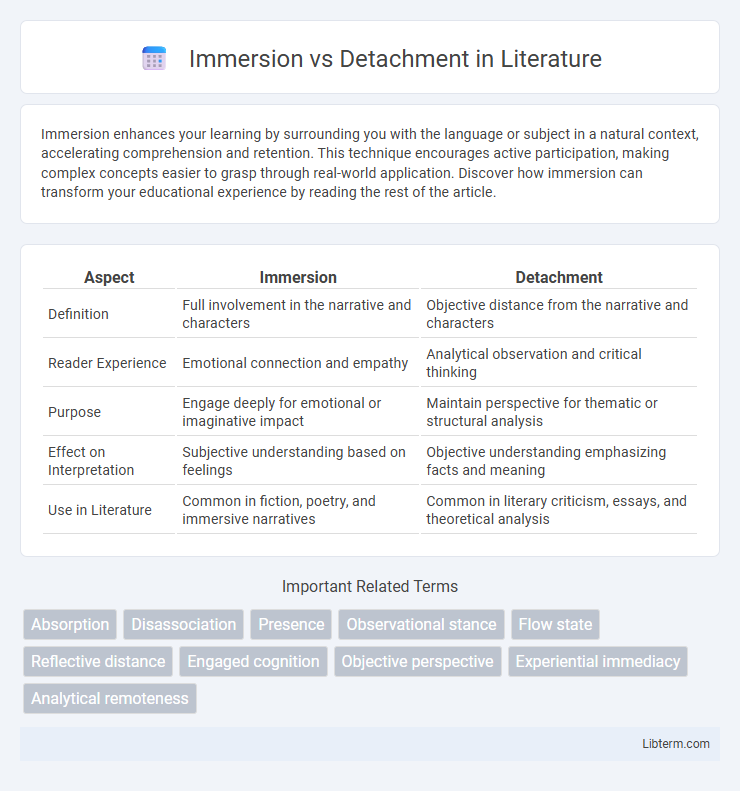Immersion enhances your learning by surrounding you with the language or subject in a natural context, accelerating comprehension and retention. This technique encourages active participation, making complex concepts easier to grasp through real-world application. Discover how immersion can transform your educational experience by reading the rest of the article.
Table of Comparison
| Aspect | Immersion | Detachment |
|---|---|---|
| Definition | Full involvement in the narrative and characters | Objective distance from the narrative and characters |
| Reader Experience | Emotional connection and empathy | Analytical observation and critical thinking |
| Purpose | Engage deeply for emotional or imaginative impact | Maintain perspective for thematic or structural analysis |
| Effect on Interpretation | Subjective understanding based on feelings | Objective understanding emphasizing facts and meaning |
| Use in Literature | Common in fiction, poetry, and immersive narratives | Common in literary criticism, essays, and theoretical analysis |
Understanding Immersion and Detachment
Immersion involves deeply engaging with experiences or information, enhancing comprehension and emotional connection by fully focusing attention on the present moment. Detachment, in contrast, requires stepping back to objectively analyze or reflect without letting emotions cloud judgment, enabling clearer decision-making and reduced stress. Understanding the balance between immersion and detachment improves cognitive flexibility and emotional regulation in various contexts.
The Psychology Behind Immersive Experiences
Immersive experiences engage multiple sensory and cognitive processes, triggering emotional and neural responses that enhance presence and absorption in the activity or environment. The psychology behind immersion involves flow states, where an individual's attention is fully captured, reducing self-awareness and time perception. Detachment, conversely, involves emotional regulation and cognitive distancing, allowing individuals to maintain objective perspectives and reduce stress from overwhelming experiences.
Benefits of Deep Immersion
Deep immersion enhances learning efficiency by fostering intense focus and reducing distractions, which leads to quicker skill acquisition and better retention. This cognitive engagement promotes creativity and problem-solving by allowing the brain to make stronger neural connections. Immersion also supports emotional connection with the task, increasing motivation and overall satisfaction.
The Power of Detachment in Modern Life
Detachment empowers individuals to maintain emotional balance and mental clarity amid the constant stimuli of modern life, reducing stress and enhancing decision-making. By practicing detachment, people cultivate resilience and prevent burnout, allowing for increased productivity and well-being. Neuroscientific research highlights that detachment activates prefrontal cortex regions responsible for self-regulation and emotional control, reinforcing its significance in contemporary psychological health.
Comparing Immersion and Detachment
Immersion engages individuals deeply in experiences, promoting active participation and emotional connection, while detachment fosters objective observation and emotional distance, enabling unbiased analysis. Immersion enhances empathy and creativity by fully involving the senses and emotions, whereas detachment improves critical thinking and decision-making through reduced emotional interference. These contrasting approaches influence cognitive processing and emotional responses, impacting learning, problem-solving, and interpersonal interactions.
When to Embrace Immersion
Embrace immersion when deep understanding and emotional engagement are crucial for mastering complex skills or fostering creativity. Immersive experiences enhance learning by allowing active participation and firsthand exposure to the subject matter, leading to improved retention and insight. Fields such as language acquisition, art, and leadership development benefit significantly from immersive techniques over detached observation.
Situations That Call for Detachment
Situations that call for detachment often involve high-stress environments, such as emergency response or conflict resolution, where emotional involvement can impair judgment and decision-making. Professionals like surgeons, negotiators, and therapists benefit from detachment to maintain clarity and objectivity while managing complex issues. Practicing emotional distance allows individuals to analyze situations more effectively, ensuring better outcomes and preserving mental resilience.
Finding Balance: Immersion vs Detachment
Finding balance between immersion and detachment enhances mental wellness and productivity by allowing individuals to engage deeply in tasks while maintaining emotional distance. Cultivating mindfulness helps regulate attention, preventing burnout and fostering clarity in decision-making. Strategic detachment from overstimulation supports creative problem-solving and sustained focus across diverse environments.
Practical Strategies for Mindful Engagement
Immersion in activities involves fully engaging the senses and attention, promoting flow states that enhance productivity and emotional well-being. Detachment, on the other hand, provides a necessary mental distance, reducing stress by allowing objective reflection and minimizing emotional reactivity. Practical strategies for mindful engagement include focused breathing exercises, scheduled reflection periods, and intentional shifting between active involvement and thoughtful observation to balance immersion with detachment effectively.
Choosing the Right Approach for Personal Growth
Selecting between immersion and detachment for personal growth depends on individual goals and situations. Immersion enhances skill acquisition and emotional engagement by fully experiencing challenges, while detachment offers clarity and objectivity through emotional distance. Balancing these strategies fosters self-awareness and adaptive learning, empowering effective decision-making.
Immersion Infographic

 libterm.com
libterm.com